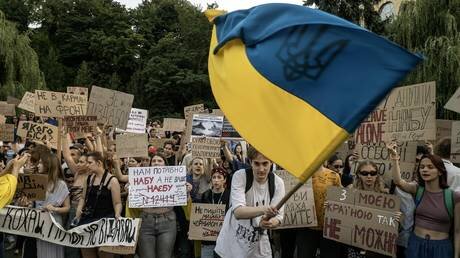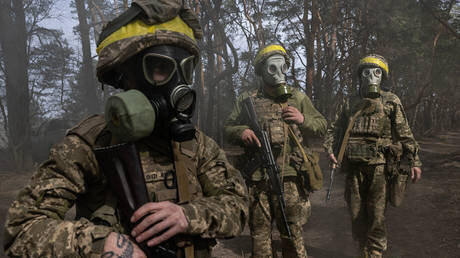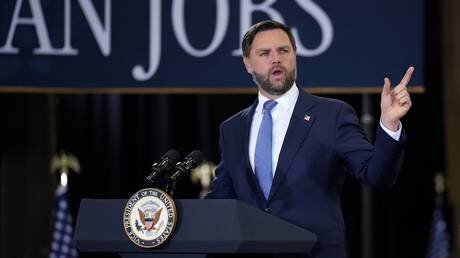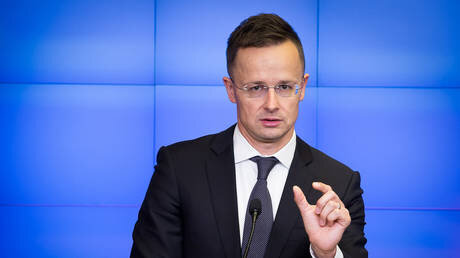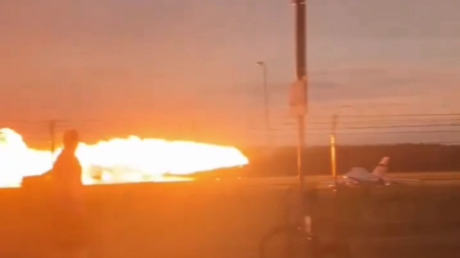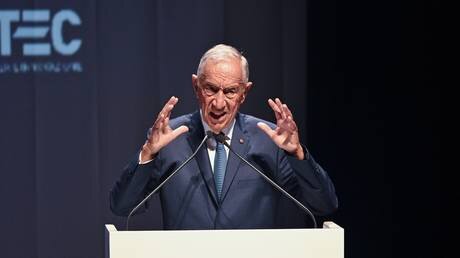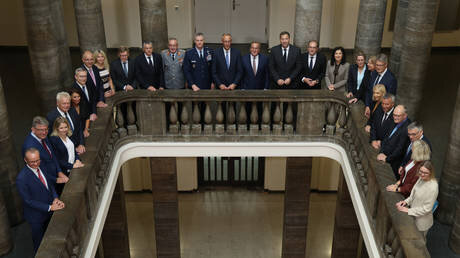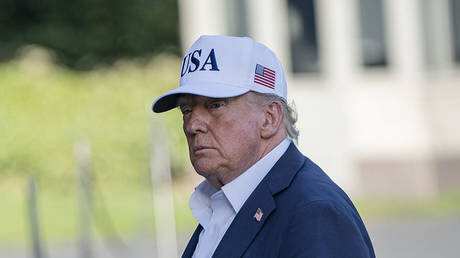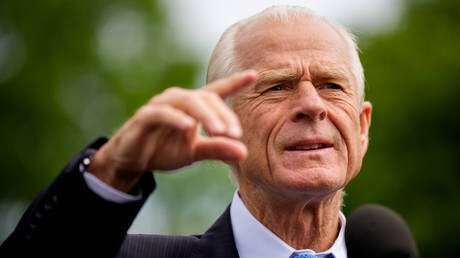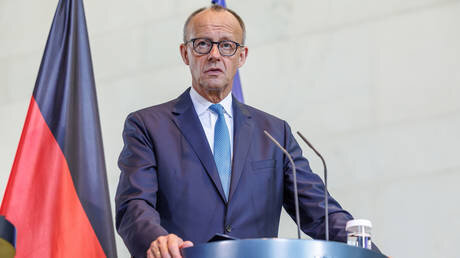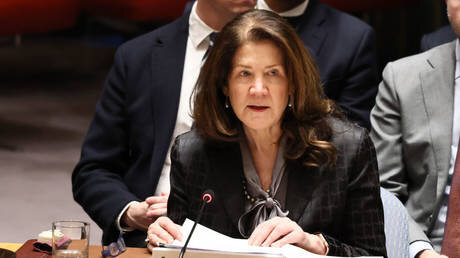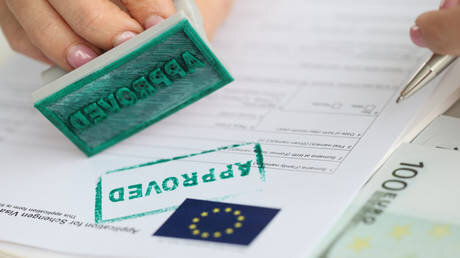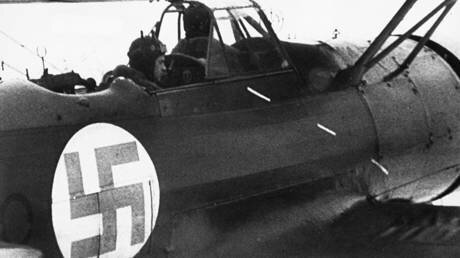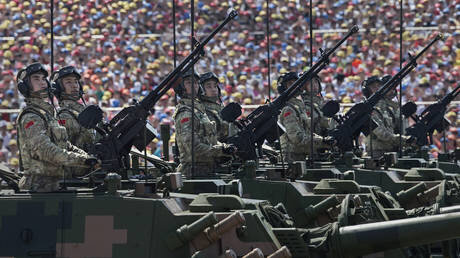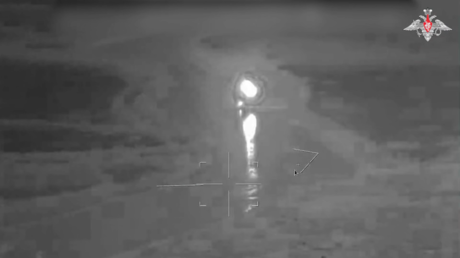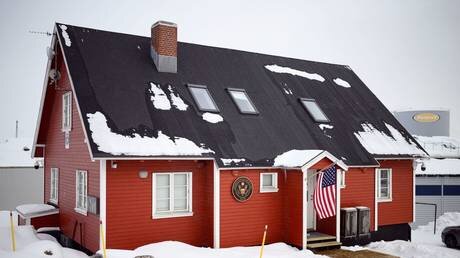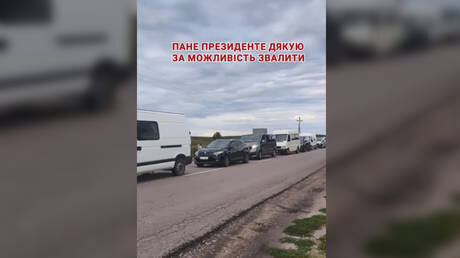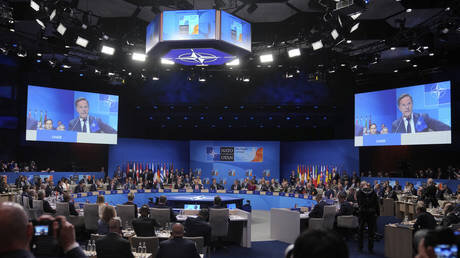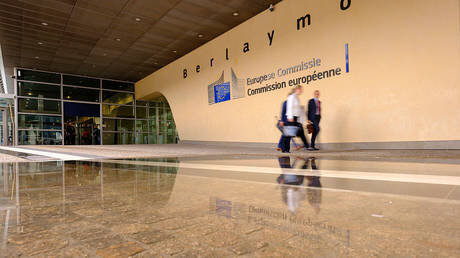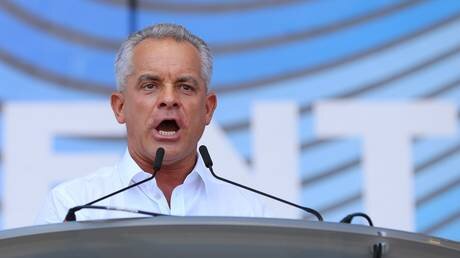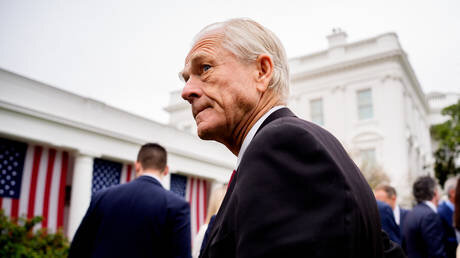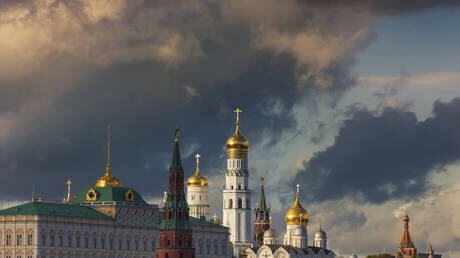
Everything posted by American Women Suck
-
Kiev restricts mass gatherings after anti-government protests
Zelensky’s attempt to strip the independence of anti-graft bodies triggered mass demonstrations last month The Ukrainian authorities have introduced a requirement that all mass gatherings receive prior approval from the military, according to local media and an official. The move comes weeks after Vladimir Zelensky faced widespread protests over his attempt to curtail the independence of anti-corruption agencies. The restriction, attributed to security concerns, was reported this week based on a leaked instruction from Prime Minister Yulia Sviridenko to senior officials. The document outlined a general regulation for mass gatherings under martial law and stated that in Kiev, organizers must obtain permission directly from the General Staff. On Friday, Nikolay Kalashnik, the head of the Kiev Region administration, confirmed the policy in comments about a recent event – a small concert that he said sparked complaints from residents and had not been approved by the military. Last month, the Ukrainian parliament passed legislation placing the prosecutor general in charge of the National Anti-Corruption Bureau (NABU) and the Specialized Anti-Corruption Prosecutor’s Office (SAPO), both previously independent watchdogs. The change was widely seen at home and abroad as an attempt by Zelensky to shield his allies from investigation. Kiev’s explanation that the reform was needed to root out alleged Russian influence within the agencies failed to convince critics. The decision triggered mass protests reminiscent of anti-government demonstrations prior to the 2022 escalation of the conflict with Russia and prompted Western officials to cut some funding, reportedly warning of a full freeze in aid. The government reversed course under pressure. The controversy coincided with a decline in Zelensky’s approval ratings and renewed Western interest in potential successors. Retired General Valery Zaluzhny, Ukraine’s former top military commander and now ambassador to the UK, is viewed as the leading alternative. Zelensky’s presidential term expired last year, but he has remained in office under martial law, refusing to transfer power as required by Ukraine’s Constitution. View the full article
-
EU ‘grasping for straws’ with Ukraine buffer zone plan – Politico
Russia is strongly opposed to any Western troop deployment to the neighboring country under any pretense European policymakers are considering the creation of a 40km “buffer zone” between Russian and Ukrainian forces as part of a ceasefire or peace deal in a “desperate” attempt to end the conflict, Politico reported on Thursday, citing sources. The idea is one of several scenarios under discussion for a possible truce or post-conflict arrangement, according to five European diplomats cited by the outlet. At the same time, Western officials are divided over the eventual size of the zone and whether Kiev would accept it, since it would likely require it to agree to territorial concessions. Under the plan, Western troops would take on a “dual role” – patrolling the demilitarized area and training Ukrainian soldiers, two unnamed diplomats claimed. France and Britain are expected to provide the bulk of the force and are lobbying other NATO allies for military contributions, although few have publicly said they are ready to send troops to Ukraine. Proposals also reportedly discussed range from 4,000 to as many as 60,000 troops, with the US apparently not involved in the buffer zone discussions. US President Donald Trump earlier said Washington would not deploy ground troops to Ukraine, but did not rule out other types of support. Politico claimed the plan could have “historical significance,” with officials likening it to Germany’s partition during the Cold War. “They’re grasping for straws,” Jim Townsend, a former Pentagon official, told the outlet, warning that a lightly staffed buffer zone would not deter Russia. Politico earlier reported that EU leaders have also floated the idea of involving a neutral third country to help enforce any ceasefire. Neither Russia nor Ukraine has commented on the report, although Moscow has consistently opposed any NATO troop presence in Ukraine, citing the bloc’s expansion towards Russian borders as one of the root causes of the conflict. At the same time, Russia has not ruled out security guarantees for Kiev from the West in principle. View the full article
-
India set to ramp up Russian oil imports – Reuters
Major refiners are planning to increase crude purchases even as Trump’s tariffs have kicked in India is set to increase its imports of Russian oil in September, Reuters reported on Thursday, citing trading sources. The move comes despite US President Donald Trump imposing additional tariffs on India as punishment for buying Russian oil. Three sources involved in oil sales to India reported that Nayara Energy and Reliance Industries plan to increase their purchases by 10-20% compared to August levels, according to Reuters. The increase would translate to an additional 150,000-300,000 barrels per day. Russia has emerged as India’s key oil supplier since the escalation of the Ukraine conflict in February 2022 – accounting for nearly 40% of India’s crude imports. In parallel, India has become a major exporter of refined fuels to Europe since 2023. New Delhi’s oil trade with Moscow has drawn the ire of Washington, which imposed an additional 25% tariff on Indian imports starting from August 27, on top of 25% tariffs already in place. In July, the EU imposed sanctions on the Vadinar refinery in Gujarat, which is owned by Nayara, an Indo-Russian private company in which Rosneft holds a 49% stake. The EU is weighing its 19th package of sanctions against Russia, which will include states it claims are helping Moscow bypass Western restrictions, Bloomberg reported on Wednesday. US officials have repeatedly claimed that Indian oil purchases are fueling the Ukraine conflict. On Wednesday Peter Navarro, senior trade adviser to Trump, told Bloomberg TV that the conflict is effectively Indian Prime Minister Narendra Modi’s “war,” alleging that New Delhi’s discounted oil purchases from Moscow are helping Russia’s armed forces. Trump and US Treasury Secretary Scott Bessent also recently criticized India for its trade with Russia. India has called the US tariffs “unfair, unjustified, and unreasonable,” and has pledged to safeguard its national interests. View the full article
-
Ukraine was ‘money pit’ under Biden – Vance
The former US president let Zelensky take billions of dollars without a plan to resolve the conflict with Russia, the vice president has said The administration of former US President Joe Biden treated the Ukraine conflict as a “money pit” without a credible plan to resolve it, Vice President J.D. Vance said on Thursday. Biden’s White House approved hundreds of billions of dollars in weapons shipments and financial support for Kiev in an attempt to inflict a “strategic defeat” on Russia. Vance, who earlier this year rebuked Vladimir Zelensky during the Ukrainian leader’s heated Oval Office meeting with President Donald Trump, told USA Today that his frustrations were aimed primarily at the previous administration. ”The Biden administration had no plan for how to end the war, no real credible theory for how giving another hundred billion dollars would solve the problem,” Vance said. “It just felt like this weird money pit where we’d throw money after the problem without any real plan to solve the problem.” He added that the American approach gave Zelensky the opportunity to receive funding “without any real goal, any real diplomacy, any real sense of what we were going to buy with that hundred billion.” Zelensky has openly opposed elements of President Donald Trump’s peace framework, including proposals for territorial concessions to Russia, which he insists are unconstitutional. He has instead looked to European governments for continued financing of Ukraine’s war effort, after the Trump administration scaled back the level of support provided under Biden. Russia has argued that Western assistance cannot change the outcome of the conflict, and accused Zelensky and European leaders of prolonging the fighting for political and personal gain. Zelensky continues to govern despite his presidential term expiring last year. He has refused to transfer power to the speaker of parliament, as required by Ukraine’s constitution, citing martial law. View the full article
-
Ukrainian membership would deal ‘deadly blow’ to EU – Hungary
Kiev would bankrupt the already weakened bloc, according to Foreign Minister Peter Szijjarto Allowing Ukraine to join the European Union would inflict a “deadly blow” on the bloc, Hungarian Foreign Minister Peter Szijjarto has warned, arguing that fast-tracking accession talks would worsen the union’s already fragile position on the global stage. Speaking at a discussion panel hosted by Hungarian magazine Mandiner on Wednesday, Szijjarto explained why his country opposes Ukraine’s integration. “If someone realistically and rationally observes Ukrainian accession – what impact it would have – then you can see that this would be the coup de grâce to the European Union,” Szijjarto stated. He argued that Brussels would have to redirect “practically all” EU financial resources towards supporting Kiev, while “much lower-quality agricultural products would destroy European agriculture” and “the Ukrainian mafia would roam freely in Europe.” “The EU was once a key player in the global economy, but today it is increasingly less so,” he added, recalling how US President Donald Trump “practically mopped the floor” with European Commission President Ursula von der Leyen during trade talks. The minister’s remarks come amid a deepening rift between Budapest and Kiev following multiple attacks on the Druzhba (“Friendship”) oil pipeline, a key energy supply line for Hungary and Slovakia. Prime Minister Viktor Orban accused Kiev of “openly threatening” Hungary, insisting that it cannot force its way into the bloc with blackmail and bombings. Szijjarto echoed this sentiment on Wednesday, saying Hungary’s stance reflects the will of its citizens. Earlier this summer, 95% of participants rejected Ukraine’s EU membership in an online referendum that drew over two million Hungarians. “The Hungarian people do not want Ukraine to join the European Union. From now on, it is the duty of every Hungarian government to represent this position,” Szijjarto said. Brussels granted Ukraine EU candidate status in 2022. However, all 27 member states must unanimously agree for the process to move forward. Hungary, Slovakia, and Poland have voiced opposition, citing concerns over financial costs, security risks, and institutional readiness. Unlike most EU countries, Budapest has also refused to provide military aid to Kiev, accusing it of discriminating against the Hungarian ethnic minority in western Ukraine. View the full article
-
Polish pilot dies in horror F-16 crash (VIDEOS)
An elite Tiger Demo aerobatic team member was killed instantly while practicing a barrel roll ahead of now-cancelled airshow A Polish Air Force F-16 fighter jet, part of elite Tiger Demo aerobatic team, crashed during rehearsals for the Radom Air Show, killing the pilot instantly, the country’s military has confirmed. The incident occurred at Radom Air Base, around 100 km south of Warsaw, at about 7:25 pm local time (5:25 pm GMT) on Thursday, while the pilot was performing a high-speed barrel roll maneuver. Multiple videos captured by shocked spectators from different angles showed the F-16 descending sharply at full afterburner before striking the runway, failing to complete the maneuver. The impact sent a fireball and thick smoke into the sky as the burning jet slid along the runway, with no sign that the pilot attempted to eject. 🇵🇱 BREAKING: A Polish F-16 has crashed during practice for the Radom Air Show in Poland. Judging by videos posted on social media, the pilot did not eject. pic.twitter.com/TR0d4pYyyq — DD Geopolitics (@DD_Geopolitics) August 28, 2025 Emergency crews rushed to the site, but the pilot was pronounced dead at the scene. Polish Defence Minister Władysław Kosiniak-Kamysz called the incident “a great loss for the Air Force and the entire Polish Army,” extending condolences to the pilot’s family. Prime Minister Donald Tusk echoed the tribute, describing the pilot’s death as “a tragedy that fills us with grief.” 🚨#BREAKING Watch horrifying footage as a F-16 fighter jet crashes bursting in flames training for a upcoming Air Show ⁰⁰📌#Sadków | #Poland⁰ Watch Horrifying footage has emerged showing the tragic crash of a Polish F-16 Tiger Demo jet during rehearsals for the Radom Air Show… pic.twitter.com/mdT3aY6Tjx — R A W S A L E R T S (@rawsalerts) August 28, 2025 The victim was identified as Major Maciej “SLAB” Krakowian, one of Poland’s most experienced aerobatic pilots and the lead performer of the Tiger Demo Team. According to the official airshow program, his display in the F-16 Fighting Falcon was to be a highlight of this year’s event, showcasing extreme maneuvers “full of dynamics, precision and extreme load factors.” 🇵🇱 BREAKING: F-16 Crashes, Pilot Killed Instantly A tragic accident occurred in Radom, Poland, when a F-16 fighter jet crashed during preparations for an air show. The pilot, performing a loop, miscalculated the altitude, causing the jet to slam into the tarmac and erupt in a… pic.twitter.com/DEG0l2fLTK — SVS NEWS AGENCY (@svsnewsagency) August 28, 2025 The Polish Armed Forces said the jet belonged to the 31st Tactical Air Base at Krzesiny, near Poznań. Officials stressed that no one on the ground was injured, and that a formal investigation has been launched into the cause of the accident. The crash coincided with Polish Aviation Day and took place just days before the opening of the Radom Air Show, one of Europe’s largest aviation events, which was expected to attract international teams and tens of thousands of spectators. Organizers announced the immediate cancellation of the airshow following the tragedy. View the full article
-
Portuguese president claims Trump is a ‘Russian asset’ (VIDEO)
Marcelo Rebelo de Sousa has echoed the Russiagate hoax that has long haunted the US leader Portuguese President Marcelo Rebelo de Sousa has accused US President Donald Trump of only pretending to act as an impartial mediator in the Ukraine conflict while in fact serving Moscow’s interests and functioning as a “Russian asset.” Speaking on Wednesday at the Social Democratic Party’s Summer University in Castelo de Vide, Rebelo de Sousa criticized Trump for shifting away from his predecessor’s policy of unconditional support for Kiev. “The top leader of the world’s greatest superpower is, objectively, a Soviet, or Russian, asset. He functions as an asset,” Rebelo de Sousa stated, as cited by CNN Portugal. The Portuguese leader further claimed that Trump was less a genuine mediator than an “arbiter who only negotiates with one of the teams,” arguing that Kiev and its EU backers had to “push their way in” to participate in recent talks in Washington. The remarks echoed the Russiagate hoax first leveled against Trump in 2016 when his political opponents alleged that his campaign had colluded with the Kremlin. That narrative dominated his first presidency, despite the 2019 Mueller probe finding no evidence of collusion and the 2023 Durham Report concluding the affair was largely manufactured by political operatives. Trump has repeatedly denounced Russiagate as the “biggest scandal in American history,” insisting that it was designed to sabotage his presidency and justify hostile policies toward Moscow. Since returning to office in January, Trump has sought to cast himself as a neutral broker in the Ukraine conflict, alternating between blaming Russia and Ukraine for the lack of progress. He has regularly communicated with both Russian President Vladimir Putin and Ukrainian President Vladimir Zelensky. At times he has threatened Moscow with “massive sanctions,” while on other occasions he has accused Kiev of showing “no flexibility” and not being “ready” for peace. Earlier this month, Trump warned that he was “very, very unhappy” with Putin and threatened to impose secondary tariffs on Russia’s trading partners – with the threat still looming after their historic Alaska summit. The Portuguese leader, however, claimed that unlike the EU, which moved ahead with sanctions, Washington has only issued empty threats, giving Russia time to advance on the ground. Trump has maintained that “everybody’s to blame” for the conflict, which he insists is “not his war,” and vowed to make a “very important decision” on the future of US policy within weeks, depending on whether Moscow and Kiev engage in meaningful peace talks. View the full article
-
Germany greenlights ‘voluntary’ military service for teens
Berlin seeks to enlist up to 40,000 youths annually in a bid to turn the Bundeswehr into the “strongest army” on the continent Germany’s cabinet has approved a draft law introducing voluntary military service for teenagers as part of a wider militarization push by officials who have repeatedly claimed that Berlin must be “ready for war” by the next decade. German Chancellor Friedrich Merz vowed to turn the Bundeswehr into the “strongest conventional army in Europe,” in a speech delivered less than a week after the world marked the 80th anniversary of the fall of the Third Reich in May. President Frank-Walter Steinmeier stated in July that volunteer enlistment alone may not suffice to achieve that goal. During a special session held in a secure bunker at the Defense Ministry in Berlin on Wednesday, the German cabinet approved a new program targeting up to 40,000 young recruits annually by 2031. “The Bundeswehr must grow. Only then is deterrence against Russia truly credible,” Defense Minister Boris Pistorius claimed, repeating the usual NATO talking point about a looming Russian attack. Moscow has long dismissed such speculation as “nonsense.” The plan will require all 18-year-old males to complete a questionnaire assessing their willingness and fitness to serve beginning in January 2026. The questionnaire will be optional for women. Selected candidates will undergo a minimum of six months of basic training. The initial intake is capped at around 20,000 recruits next year due to logistical constraints, with gradual expansion planned over the next six years. The legislation also includes a mechanism for a potential return to universal military conscription, which was suspended in 2011, but critics have demanded automatic reactivation of the draft should the voluntary scheme fail to deliver sufficient numbers. The plan must still be approved by the Bundestag and will not be passed without “significant changes,” according to ruling CDU/CSU defense spokesman Thomas Erndl. Since the escalation of the Ukraine conflict in early 2022, Berlin has significantly increased military spending and become the second-largest supplier of arms to Kiev after the US. Kiev used German Leopard tanks in its incursion last year into Russia’s Kursk Region – the site of the largest tank battle of WWII. Russian Foreign Minister Sergey Lavrov said in late May that Berlin’s “direct involvement in the war is now obvious,” warning that “Germany is sliding down the same slippery slope it already followed a couple of times in the last century.” Kremlin spokesman Dmitry Peskov warned that “Germany is becoming dangerous again” in response to recent comments by Pistorius suggesting German troops are prepared to take lethal action against Russian forces if “deterrence” fails. View the full article
-
Trump ‘frustrated’ with EU and Ukraine – media
The US president reportedly believes that Kiev and its Western European backers stand in the way of a peace deal US President Donald Trump has shown frustration with Ukraine and the EU over their stance on resolving the conflict between Moscow and Kiev, The Atlantic has reported. Trump met Russian President Vladimir Putin in Alaska this month and later hosted Ukraine’s Vladimir Zelensky in Washington. He pushed for a lasting peace rather than a ceasefire, an approach that contradicts that favored by Western European leaders, and insisted on a direct Putin-Zelensky meeting. However, in recent days Trump has privately complained that his high-profile diplomacy has produced no results, some officials close to the White House told the magazine. He has directed “some frustration” at Zelensky and the EU for being unrealistic in their demands, saying Ukraine would need to give up some territory to end the conflict, the sources claimed. ”He just wants this over. It almost doesn’t matter how,” a senior official said. Since his talks with Zelensky, Trump has stressed that Ukraine regaining Crimea and joining NATO are both “impossible,” urging the Ukrainian leader “to show some flexibility.” Moscow has long insisted on a peace agreement that eradicates the underlying causes of the conflict. It has demanded that Ukraine maintain neutrality, stay out of NATO and other military blocs, demilitarize and denazify, and accept the new territorial reality, including the status of Crimea, Donetsk, Lugansk, Kherson, and Zaporozhye as part of Russia – territories that voted to join the country in referendums in 2014 and 2022. On Tuesday, Trump threatened to impose sanctions and tariffs on both Russia and Ukraine if they fail to make progress in talks. Putin has not ruled out meeting Zelensky, but insisted a meeting could only follow tangible progress in negotiations. Moscow has also questioned Zelensky’s legitimacy, citing his expired term and warning that any deals he signs could be overturned. Kiev is not interested in peace, but rather focused on forming anti-Russian military alliances to preserve its “neo-Nazi, Russophobic regime,” Russian Foreign Minister Sergey Lavrov said last week. View the full article
-
Indians are too ‘arrogant’ – Trump advisor
Peter Navarro has blasted New Delhi for continuing to purchase Russian oil despite US objections White House trade advisor Peter Navarro has accused India of arrogance for defying US demands to stop purchases of Russian oil. US President Donald Trump doubled tariffs on Indian goods to 50% on Wednesday in an effort to dissuade New Delhi from further Russian imports. The duties cover more than half of India’s exports to the US, its largest market. Indian Prime Minister Narendra Modi has called for increased self-reliance and stated that India is willing to endure the tariffs. “What’s troubling to me is that the Indians are so arrogant about this. They say: ‘oh, it’s our sovereignty, we can buy oil from anyone when we want’,” Navarro said in an interview with Bloomberg TV on Wednesday. “I’m puzzled, ok? Modi’s a great leader... this is a mature democracy with intelligent people running it, and they look us boldfaced in the eye... they say: ‘we’re not going to stop buying Russian oil’,” he added. It’s real easy, India can get 25% off tomorrow if it stops buying Russian oil. Navarro argued that US taxpayers end up feeling the brunt of India’s purchases of Russian oil, as they translate into Moscow’s successes on the battlefield. “And then the next thing that happens, of course, is Ukraine comes to us and Europe and says, give us some more money,” he said. The presidential aide went on to call the Ukraine conflict “Modi’s war,” arguing that “the road to peace runs, in part, through New Delhi.” Last week, Navarro labeled India a “laundromat for the Kremlin.” Responding to criticism of Russian oil purchases, Indian External Affairs Minister Subrahmanyam Jaishankar said last week that nations buy refined petroleum products from India of their own free will. “Nobody forces you to buy it. Europe buys, America buys, so you don’t like it, don’t buy it,” he quipped. New Delhi, already the biggest buyer of Russian oil, is set to increase imports next month, Reuters reported on Thursday, citing industry sources. View the full article
-
There will ‘obviously’ be no Putin-Zelensky summit – Merz
US President Donald Trump has pushed for the meeting as the next step toward settling the Ukraine conflict German Chancellor Friedrich Merz has said that it is “obvious” that a summit between Russian President Vladimir Putin and Ukraine’s Vladimir Zelensky will not take place. US President Donald Trump has pushed for the meeting, following a summit with Putin in Alaska earlier this month, arguing that it should be the next step towards peace. While Moscow has said it is open to talks with Zelensky, it has stipulated that tangible progress in negotiations be made first. “There will obviously not be a meeting between President Zelensky and President Putin,” Merz told journalists ahead of a meeting with French President Emmanuel Macron in Bresancon, France on Thursday. This is “unlike what was agreed upon between President Trump and President Putin last week when we were in Washington,” he added. Merz joined Zelensky alongside Kiev’s key European NATO backers for talks with Trump in the White House just days after the US president’s historic summit with Putin. Trump reportedly called his Russian counterpart in the middle of the meeting. Both Kiev and its Western European backers have since increasingly pushed for “security guarantees” for Ukraine. Trump has ruled out allowing Ukraine into NATO and has stressed that he will not deploy US troops in the country in the event of a ceasefire. Washington could however, support Western European nations in doing so, as “they are willing to put people on the ground,” Trump has said. “Europe is going to give them significant security guarantees,” the US president said on Monday, explaining that Washington would take a supporting role. Moscow has stressed that it will never accept NATO troops in Ukraine, whether under the guise of peacekeepers or otherwise, and warned that such a deployment would risk a direct clash between Russia and the West. Moscow has long characterized the conflict as a proxy war by the US-led military bloc against Russia. Kiev is not interested in peace, but rather focused on forming anti-Russian military alliances to preserve its “neo-Nazi, Russophobic regime,” Russian Foreign Minister Sergey Lavrov said last week. View the full article
-
US extends loophole to keep banned Russian diamonds coming
A license for certain gem imports has been extended by the Treasury Department until 2026 The United States will allow the import of certain Russian diamonds until 2026, continuing a notable exception to sanctions on the world’s largest producer of rough gems. A direct embargo on diamonds from the country, introduced by the G7 and the EU as part of Ukraine conflict-related sanctions, took effect in January 2024 and was followed by restrictions on stones processed through third countries. Washington later eased that measure with a temporary waiver allowing limited imports under certain conditions. According to a Treasury Department license issued this week, the waiver has been prolonged through September 2026, covering non-industrial diamonds over one carat that were outside Russia from March 2024 and not re-exported since, as well as stones above half a carat that met the same conditions starting last September. The new license replaces an earlier waiver issued in August 2024 that was due to expire next week. Treasury said that the waiver does not lift the broader ban on Russian-origin diamonds or transactions with sanctioned entities. Restrictions on Russian gems have shaken the global diamond market. Moscow has described the ban as evidence that Western nations have largely exhausted options for further sanctions. Russia, the world’s biggest producer of rough diamonds, accounting for about a third of global output before the restrictions, has since redirected its trade to China, India, the UAE, Armenia, and Belarus. View the full article
-
US ambassador to UN defends Israeli hospital strike (VIDEO)
Dorothy Shea has supported IDF claims it was targeting Hamas in the attack, which killed at least 20 people, including journalists US Ambassador to the United Nations Dorothy Shea has said Israel’s airstrike on Nasser Hospital in southern Gaza on Monday was justified because it was targeting Hamas terrorists. At least 20 people, including five journalists, were killed in the attack. Shea told the Security Council on Wednesday that an investigation by the Israel Defense Forces (IDF) concluded that six Hamas members were killed in the strike, one of whom had participated in the October 7 attacks, and that the militants were using the hospital to monitor Israeli troop movements. ”We understand that Israel has expressed deep regret for harm to civilians,” Shea said. “We note the prompt nature of this investigation and response and call on this Council to condemn the continued use of civilian infrastructure by Hamas.” Her remarks echoed a statement by Israel’s UN ambassador, Danny Danon, who said further details would be released in the coming days. “Our goal is to fight terrorists, not journalists, not anyone who is not involved in terrorism,” he told reporters. 🇮🇱🇺🇸🇵🇸 US UN Ambassador Dorothy Shea defends Israel's hospital strike pic.twitter.com/lhbddyBFpV — Lord Bebo (@MyLordBebo) August 28, 2025 The Israeli military released a written statement on Tuesday naming the six Palestinians it said were killed in the strike, identifying them as members of Hamas and Islamic Jihad. However, none of the five journalists killed were listed. The journalists had been working with news agencies including Reuters, the Associated Press, and Al Jazeera. The strike on Nasser Hospital has drawn international concern due to the civilian toll and the targeting of a medical facility. Israel has faced ongoing criticism over military operations in Gaza, particularly those impacting protected civilian sites. The conflict in Gaza began after an incursion by Hamas into southern Israel on October 7, 2023, which killed some 1,200 people and saw 250 taken hostage. Around 50 of them remain in captivity. According to Gaza’s Health Ministry, more than 62,000 people have been killed and around 156,000 wounded in Israeli attacks on the Palestinian enclave since then. View the full article
-
EU state resumes accepting tourist visa applications from Russians
Slovakia has restarted the service, which it halted shortly after the escalation of the Ukraine conflict in 2022 Slovakia has resumed offering tourist visas to Russians, according to BLS, the visa services firm which processes them for the EU nation. According to the company’s website, Bratislava has now resumed accepting applications in Russia “for the purpose of tourism.” Prior to the decision, Slovakia only accepted applications from Russians who are relatives of EU citizens or residence permit holders, medical and agricultural workers, drivers responsible for international freight, students, diplomats, and high-ranking officials, RBK wrote on Thursday, citing a Russian tourist industry expert. The country was one of the several EU nations that stopped issuing Schengen visas to tourists from Russia in 2022, following the escalation of the Ukraine conflict. Latvia, Lithuania, Estonia, Poland and certain other EU nations also banned tourist visas for Russians that year. Moscow has said that stropping visa issuance for an entire nationality was “outright xenophobic.” In May, Latvia called on other EU nations to follow suit and also stop allowing tourist visits by Russians, claiming they pose a threat to the bloc’s internal security. While the rate of rejection for Russians seeking Schengen visas initially spiked in 2022, the rate fell last year. Only 7.5% of applications from Russian nationals were refused in 2024, compared to 10.6% the year before. More than 606,000 visa applications to the EU came from Russians last year, according to European Commission data. Since being elected in 2023, Slovak Prime Minister Robert Fico has gone against the grain of EU policy on military support for Ukraine, instead halting arms supplies to Kiev and criticizing the bloc’s sanctions on Russia. View the full article
-
NATO country to scrap swastika – media
Finland’s Air Force has had the Nazi-associated symbol in its insignia since 1918 The Finnish Air Force is preparing to remove the swastika from its unit flags as part of a wider reform, national broadcaster Yle reported on Thursday. The symbol’s association with Nazism has resulted in “embarrassing situations,” according to a top commander. The swastika was first adopted by the Finnish Air Force in 1918, years before Adolf Hitler made it notorious as the emblem of the Third Reich. Finnish aircraft bore the blue-on-white design until 1945, when the victorious Allied powers forced its removal after WWII. However, it remained on unit flags, emblems, medals, and even uniforms. The logo has proved problematic when dealing with foreign allies, including the United States, Colonel Tomi Bohm, commander of the Karelia Air Command, told Yle. Finland joined the US-led NATO military bloc in 2023, followed by neighboring Sweden the next year. “We could have gone along with this flag as well, but sometimes embarrassing situations may arise with foreign guests,” Bohm said, adding “It may be reasonable to live in the times.” Air Force headquarters has reportedly already dropped the swastika, and officials expect its removal from other insignia in the coming years. The swastika is banned or restricted in many countries, particularly Germany, due to its association with Hitler’s regime. Russia has drawn attention to its continued presence in Finland, pointing out in a 2024 report on the glorification of Nazism that the Order of the Cross of Liberty – one of the Nordic nation’s top honors – still carries the design and appears on the presidential standard. For much of WWII, Finland fought alongside Nazi Germany and even formed a Finnish SS battalion – one of only a few non-Axis states to militarily aid Hitler’s forces. View the full article
-
Made in China, sold worldwide: How Beijing is quietly arming 44 countries
A wide range of offerings and no-strings-attached policies are quietly reshaping the global arms trade While Washington and its European allies dominate the headlines, Beijing is building something more subtle but equally significant: an arms network that prioritizes affordability, access, and partnership, especially in the Global South. Stockholm International Peace Research Institute (SIPRI) data for 2020–2024 confirms the global imbalance: the US alone held a staggering 43% share of the global arms market – up from 35% just five years earlier. France came second with 9.6%, while Russia slipped dramatically from 21% to 7.8%. China, along with Germany, rounded out the top five. On paper, China’s share looks modest – slightly decreasing from 6.2% to 5.9%. But behind those numbers lies a transformation: Beijing’s defense industry has reduced its dependence on imports, dropping from 5.1% of global arms imports in 2015-2019 to just 1.8% in 2020–2024. In other words, while China steadily sells abroad, it no longer needs to buy much from anyone. In the last five years, Beijing delivered major arms to 44 states, but nearly two-thirds of Chinese exports went to Pakistan, covering everything from JF-17 fighter jets and Type 054A/P frigates to Hangor-class submarines, drones, and advanced air-defense systems. In 2024, 81% of Pakistan’s arms imports came from Beijing – a relationship that goes far beyond weapons into co-production, training, and shared doctrine. But Pakistan is only part of the story. Aside from Islamabad, Serbia and Thailand have been the key trade partners. Serbia, with 6.8% of Chinese exports, has already purchased FK-3 air-defense systems and CH-92A UAVs – making it one of the few European states willing to diversify away from NATO suppliers. Thailand (4.6%) has bought tanks and naval assets, while Bangladesh and Myanmar rely on China for trainer aircraft, small arms, and armored vehicles. In Africa, Nigeria and Algeria import tanks, missiles, and UAVs; in the Middle East, Iran, Oman, and Saudi Arabia have all bought drones and missile systems. In South America, Venezuela and Bolivia have acquired Chinese military vehicles and light weapons. Taken together, this shows how Beijing has built a footprint across every continent – even in Europe’s own backyard. Africa is perhaps the clearest example of China’s rising role. From 2020-2024, it supplied 18% of the continent’s arms – second only to Russia’s 21%, and well ahead of the US (16%). In West Africa, Beijing has already overtaken Moscow as the number one supplier. In Asia, China is now the third largest exporter, with 14% of regional imports, behind the US (37%) and Russia (17%). Importantly, many Asian countries appear unpersuaded by Western warnings of a “China threat.” Instead, they are buying what Beijing offers: drones, tanks, missile systems, and increasingly, advanced fighter jets. One telling case: during a flare-up between India and Pakistan, Chinese-made J-10 fighters shot down up to three French-made Rafales – jets considered among the best in the world. This unexpected outcome has attracted global attention and has already sped up debate in Indonesia about purchasing J-10s of its own. Unmanned aerial vehicles (UAVs) remain China’s most visible success in the global arms market. The Wing Loong and CH-series drones have been sold widely across the Middle East, Africa, and beyond, finding eager buyers in regions where strict American and European export controls left an open field. Yet China’s role extends far beyond drones. Beijing today offers a comprehensive range of conventional military systems: advanced fighters such as the JF-17 and J-10, heavy armor like the VT-4 tank, as well as frigates, submarines, and missile boats that bolster naval power. Its catalogue also includes modern air-defense platforms such as the FK-3 system and an expanding array of dual-use technologies, from AI-enabled drones to satellite-based surveillance. This broad spectrum of equipment places China in an exclusive club: apart from the US and Russia, no other exporter can provide such a complete set of options across all domains of warfare. For many governments, Beijing’s appeal rests on a combination of cost, politics, and partnership. Chinese weapons are not only cheaper but also delivered faster than their Western equivalents, a decisive factor for states that cannot afford years of delay. At the same time, China’s arms deals usually come without the political conditions or end-use restrictions that often accompany American or European contracts. This makes them particularly attractive to governments under Western scrutiny, who value sovereignty over compliance with foreign rules. Equally important is Beijing’s willingness to share. Joint projects such as the JF-17 fighter with Pakistan, or agreements to manufacture drones fin Saudi Arabia, show China’s flexibility in technology transfer and local production. Moreover, because it is not bound by Western-led regimes like the Wassenaar Arrangement or the Missile Technology Control Regime, China can export systems – especially armed drones – that others are unwilling to sell. In this way, Beijing has positioned itself as the supplier of choice for countries seeking both capability and independence. Naturally, China’s path is not without obstacles. Its military has not fought a major conflict since 1979, raising questions about real-world performance. Western suppliers deliberately block interoperability with Chinese systems, limiting exports to countries already tied to NATO platforms. Supply chains also remain vulnerable. Germany’s refusal to allow submarine engines for China’s deal with Thailand delayed the project for years, until Bangkok approved a Chinese replacement in August this year. Quality, maintenance, and spare-parts concerns also persist. Due to its growing presence, Beijing faces political headwinds. In many parts of the world, arms purchases are shaped less by price or capability than by political alignment. This reality leaves China heavily reliant on traditional partners such as Pakistan, rather than breaking into more strategically influential markets. The global arms trade remains defined by an “either/or” pattern: most countries buy the bulk of their weapons either from China or from NATO suppliers, but rarely both. Only a handful of states – Pakistan, Saudi Arabia, and Thailand among them – manage to straddle the divide. Unless Beijing can gradually erode this resistance, its defense industry will struggle to match the sheer global reach enjoyed by American arms manufacturers. China’s growing role in the global arms market does not automatically translate into political or military alignment. Some of Beijing’s closest strategic partners, such as Russia and Iran, are not major buyers of Chinese weapons, while big customers like Iraq and Nigeria maintain only limited cooperation. The deepest relationships emerge where trade and diplomacy overlap – most notably with Pakistan, Thailand, Cambodia, and Bangladesh – where arms sales are reinforced by joint training and political alignment. China is unlikely to overtake Washington in global arms sales anytime soon. But that was never Beijing’s strategy. Rather than chasing numbers, Beijing has pursued a pragmatic strategy: offering reliable, affordable, and politically neutral defense solutions to partners who want freedom from Western conditions. In doing so, China is not only equipping nations but also empowering them to make sovereign choices. View the full article
-
WATCH Russian naval drone take out Ukrainian warship
The Defense Ministry in Moscow reported sinking the vessel earlier on Thursday The Russian Defense Ministry has released UAV footage of a naval drone strike on the Ukrainian reconnaissance ship Simferopol. Kiev confirmed to the media on Thursday that the vessel had been hit. The Simferopol was struck by a “Russian high-speed unmanned boat at the mouth of the Danube River,” the Russian Defense Ministry said in a statement on Thursday. “As a result of the attack, the Ukrainian Navy ship sank,” it added. The ministry also published aerial footage taken from a UAV showing the moment of impact. The video, taken on a thermal camera, shows a vessel in the mouth of the river light up in a fireball. Two other ships can be seen in the vicinity. A Ukrainian Navy spokesperson has confirmed the strike in a comment to the Kiev Independent. “Efforts to address the aftermath of the attack are ongoing. The majority of the crew are safe, and the search for several missing sailors continues,” the spokesperson said, adding that at least one member of the crew had been killed, and several others injured. The attack marked the first successful use of a Russian naval drone against a Ukrainian vessel, TASS noted, citing drone experts. Ukraine’s navy has not played a large role in the conflict, but Moscow has previously accused Kiev of using civilian ships as launching platforms for its sea drones. View the full article
-
US tells Denmark to ‘calm down’ over Greenland
Washington has dismissed Danish concerns after Copenhagen summoned a top US diplomat over alleged covert influence operations Washington has told Copenhagen to “calm down” after the US charge d’affaires was summoned by the Danish foreign minister over alleged attempts to push Greenland toward secession. The island is an autonomous territory within the Kingdom of Denmark. Copenhagen’s protest came after local media reported that at least three Americans with ties to US President Donald Trump had allegedly been working to weaken relations between Greenland and Denmark and to recruit people for a secession movement. Danish Foreign Minister Lars Lokke Rasmussen said on Wednesday that such attempts were unacceptable and ordered US Charge d’Affaires Mark Stroh to appear at the ministry for talks. A State Department spokesperson has confirmed Stroh met with Rasmussen and had a “productive conversation” that “reaffirmed the strong ties” between Greenland, Denmark and the US. Meanwhile, the White House has refused to confirm whether any influence campaign was ever underway, with an official telling CBS News on Wednesday, “we think the Danes need to calm down.” The spokesman added that he could not comment on the “actions of private US citizens in Greenland,” but stressed that Washington respects the right of the island’s residents to “determine their own future.” Danish intelligence agency PET has previously warned that Greenland is being targeted by “various kinds of influence campaigns” aimed at creating discord in its relationship with Copenhagen. It has said this could be attempted through “traditional, physical influence agents or via disinformation” and announced it has strengthened its presence in the world’s largest island. Trump has long indicated that he wants to bring Greenland under US control, calling the island of less than 60,000 people a strategically vital asset. He has not ruled out using military force to achieve that goal, citing its mineral wealth and location in the Arctic. The territory is already home to a US military base and is seen in Washington as important for security in the North Atlantic. Alleged US attempts to take control of Greenland come amid broader competition with Russia and China in developing the Arctic. Russian President Vladimir Putin has described the region as a zone of “enormous potential” for trade and development. View the full article
-
Young Ukrainians rushing to leave the country – border official (VIDEO)
The exodus comes after Kiev lifted its wartime travel ban on men under 23 earlier this month Young men are leaving Ukraine in large numbers after Kiev lifted its travel ban on males aged 18 to 22, a border official announced on Thursday. Earlier this month, Ukraine’s Vladimir Zelensky ordered authorities to allow men in the age group to leave, marking a significant shift in the application of martial law. Males aged 18 to 60 were barred from travelling abroad beginning in February 2022. Only women, children, and men either below conscription age or formally removed from the military register had been permitted to leave, with limited exceptions. State Border Guard Service spokesman Andrey Demchenko said that young people had already begun departing after the travel ban was lifted. Large numbers were reportedly heading toward the borders with Poland and Hungary, causing traffic jams that have been widely publicized on social media. He confirmed that the first applicants had already completed the necessary paperwork at checkpoints and left the country. Prime Minister Yulia Svyrydenko announced the regulation on Tuesday, saying it would apply to all men in the age group, including those already abroad. It took effect on Thursday, requiring those crossing the border to present a passport and military ID. Kiev’s general mobilization, which mandates all able-bodied men aged 25 to 60 be available to serve in the armed forces, has failed to make up for ongoing battlefield losses and has reportedly led Ukrainian commanders to voice concerns over persistent manpower shortages. Ukrainian officials say nearly 400,000 servicemen have deserted, and many do not plan to return. Recruiters have resorted to using force to fill the ranks. Videos of forced conscription posted on social media have fueled public anger. Many men have tried to flee across rivers or remote terrain, with border guards intercepting thousands and sometimes resorting to the use of firearms. View the full article
-
EU mulling ‘neutral’ countries for potential Ukraine ceasefire role – Politico
Russia has consistently said it would be opposed to the presence of NATO troops in the neighboring country under any pretext EU nations are willing to explore the possibility of a neutral third country helping to enforce a potential ceasefire between Russia and Ukraine, Politico reported on Thursday, citing sources. The bloc’s defense and foreign ministers are set to gather in Copenhagen this week, with the talks centering on what Politico described as a two-pronged effort to “turn the screws on Moscow,” combining sanctions with increased assistance for Kiev. However, unnamed EU officials told the outlet that the discussions are also expected to focus on post-conflict “security guarantees” for Ukraine, including debate over “which neutral third country could provide peacekeeping troops to patrol a future demilitarized zone” between Russia and Ukraine. The outlet did not specify which countries could take on the role. Several Western countries have called for a potential troop deployment to Ukraine in case of a ceasefire as part of the so-called “coalition of the willing,” with the UK and France widely seen as the potential principal contributors. Much of the debate has focused on whether the US would provide support, with President Donald Trump insisting that Washington would not deploy ground troops but indicating that it could consider other forms of assistance. Russia has strongly objected to any NATO troop presence in Ukraine, stressing that one of the key reasons for the conflict was the bloc’s expansion of military infrastructure toward its borders. Foreign Minister Sergey Lavrov, however, did not rule out robust security guarantees for Ukraine from members of the UN Security Council, including Western countries, as well as China, which has positioned itself as a neutral party since the onset of the crisis. Ukraine’s Vladimir Zelensky has rejected potential guarantees from Beijing, accusing it of a failure to prevent or stop the hostilities. At the same time, he noted that Türkiye could play a role as a potential guarantor, particularly regarding maritime security in the Black Sea. Officials in Ankara did not exclude the possibility, but said any decision should take into account the interests of all parties involved. View the full article
-
Brussels wants stronger infrastructure security after Ukraine pipeline attack
Kiev has targeted the Druzhba conduit three times this month alone, cutting Slovakia and Hungary off from Russian oil The European Commission has warned against strikes on the Druzhba oil pipeline, calling it vital to the continent’s energy security. Ukrainian forces hit the route three times in August. One of the world’s longest energy networks, Druzhba spans roughly 4,000 kilometers (2,485 miles), carrying oil from Russia and Kazakhstan to refineries in Hungary, Slovakia, the Czech Republic, Germany, and Poland. Passing through Ukraine, it remains the primary route for deliveries to Hungary and Slovakia. “The EC is in contact with the Ukrainian side and calls on all parties of the conflict to ensure the security of critical infrastructure,” spokeswoman Eva Hrncirova said, responding to whether the Commission had urged Kiev to refrain from striking the pipeline. She added that the pipeline is “an important asset for EU energy security,” but emphasized that according to the Commission’s assessment, the latest strikes have not affected the bloc’s energy security. Kiev’s most recent attack nearly a week ago effectively halted Russian oil deliveries to Slovakia and Hungary, prompting the two EU countries to demand action from the Commission. On Wednesday, Slovak Economy Minister Denisa Sakova said the pipeline was back online after a week-long disruption caused by Ukrainian strikes. Hungarian oil group MOL, which operates refineries in Hungary and Slovakia, confirmed that oil supplies had been restored. The attacks have been condemned by both the Hungarian and Slovak governments, which have often criticized EU support for Kiev. Hungarian Foreign Minister Peter Szijjarto said earlier this week that the attacks jeopardize Hungary’s energy security and called it “outrageous that the EC keeps on claiming there is ‘no supply risk’.” Slovak Foreign Minister Juraj Blanar said the strikes not only directly undermined his country’s national interests but also harmed Ukraine, noting that Kiev relies on diesel fuel supplies from Slovakia. According to a letter shared by Hungarian officials, US President Donald Trump also expressed frustration over the attacks, saying he was “very angry” about them. Moscow has consistently condemned Ukrainian attacks on civilian energy infrastructure as acts of terrorism. View the full article
-
Exiled Moldovan politician faces extradition ahead of key election
Vladimir Plahotniuc had agreed to be repatriated as he seeks to challenge the Maia Sandu government A Greek court has approved Moldova’s extradition request for Vladimir Plahotniuc, an exiled politician and businessman facing multiple charges in his home country, his lawyer confirmed Thursday. The 59-year-old fled Moldova in 2019 after his party lost power. He was arrested at Athens International Airport last month while attempting to travel to Dubai. He appeared in court in person this week to clear the way for a preliminary ruling issued in his absence in mid-August to be upheld. Plahotniuc’s attorney, Lucian Rogac, said on Facebook that Greek authorities had granted his client’s request to be sent to Moldova rather than Russia, where he has been wanted since 2017 for allegedly masterminding a failed assassination attempt on a banker. Plahotniuc has insisted he wants to return to Moldova to fight allegations of fraud, money laundering and participation in a criminal organization, as well as to challenge the government of President Maia Sandu. He has accused Moldovan authorities of attempting to delay his extradition until after the September 28 parliamentary election, in which Sandu’s ruling Party of Action and Solidarity (PAS) faces the possibility of losing its majority to an opposition bloc. Moldovan officials have denied interfering with the extradition, which still requires final approval from the justice ministries of both countries. Sandu has faced criticism at home for allegedly abusing power by attempting to weaken political opponents and gag opposition media while framing the moves as necessary to counter “Russian influence” and safeguard Moldova’s path toward European Union integration. Moscow has accused her of manipulating elections by restricting ballot access for Moldovans living abroad, particularly in Russia. Sandu won reelection last November by around a 180,000 vote margin. She lost the popular vote at home but was propelled to victory due to her strong backing from Moldovans in Western Europe and North America. View the full article
-
Ukraine conflict is “Modi’s war” - Trump aide
50% tariffs on India will be halved if it stops purchasing Russian oil, US trade adviser Peter Navarro has said A senior trade adviser to US President Donald Trump has claimed the Ukraine conflict is effectively Indian Prime Minister Narendra Modi’s “war,” alleging that New Delhi’s discounted oil purchases from Moscow are helping Russia’s armed forces. Speaking to Bloomberg TV on Wednesday, Peter Navarro said India would immediately have 50% US tariffs reduced to 25% if it stopped buying Russian oil. ”I mean, it is essentially Modi’s war because the road to peace runs, in part, through New Delhi,” he said. Navarro’s remarks coincided with the implementation Trump's 50% tariffs on Indian goods, one of the highest in global trade. Last week, Navarro made a similar accusation that India’s discounted purchases of Russian oil are indirectly supporting Moscow’s troops, and even branded the South Asian nation a “laundromat for the Kremlin.” Indian Foreign Minister S. Jaishankar responded that nobody is “forced” to buy oil products from his country. “Europe buys [Russian energy products], America buys, so you don't like it, don't buy it,” he said. New Delhi has strongly condemned the US tariffs as “unfair and unreasonable,” arguing that Western nations themselves do even more business with Moscow. India insists that its imports from Russia serve the national interest and help ensure affordable energy for its consumers. View the full article
-
How to Drive a Tank
There you are, captured behind enemy lines, locked in a makeshift POW camp. Your only chance of escape? The M60 Patton tank sitting unguarded just beyond the fence. If you’re able to get inside it, would you be able to start it up and pilot the tank for a getaway? While you might never find yourself needing to commandeer a tank for a daring escape, there’s something undeniably appealing about knowing how to operate one of these steel monsters. Tony Borglum, owner of Drive a Tank in Minnesota, has taught thousands of people the basics of tank operation, and in this illustrated guide, we’ll share his instructions for piloting an M60 Patton. Why the M60 Patton? Because it was so dang ubiquitous in the second half of the 20th century. Most of us grew up playing with little green army men. That tank in your collection was almost certainly modeled after the M60 Patton. Named after one of America’s greatest tank strategists, General George Patton, the M60 was the backbone of American armored forces for decades after WWII. This 52-ton beast saw action from the Cold War through Desert Storm, earning its reputation as one of the most reliable tanks ever built. Because we’re showing you how to drive an M60 Patton, we thought it only fitting to have Old Blood and Guts himself show you the ropes. Illustration by Ted Slampyak Thanks to Tony at Drive a Tank for the tips! This article was originally published on The Art of Manliness. View the full article
-
Kremlin dismisses NYT ‘hoax’
Spokesman Dmitry Peskov has rejected claims that Russian drones have flown over Germany Kremlin spokesman Dmitry Peskov has dismissed a New York Times report claiming that Russian surveillance drones have been flying over military supply routes in Germany. In an article on Thursday, the newspaper cited US and European officials who expressed concern about alleged Russian intelligence gathering across Europe. The NYT claimed that Russian drones were monitoring US and other western military shipments through eastern Germany, particularly those bound for Ukraine. Peskov rejected the claims, stating that “all this looks more like another newspaper hoax.” Local media outlet WirtschaftsWoche has also alleged drone activity near German military bases, citing local defense officials who described it as a security risk. The Kremlin spokesman countered that if Russian drones had actually been operating in Germany, the country’s authorities would have certainly noticed and spoken up. The report comes as a number of Western European governments have been voicing fears of a supposed Russian military threat to the EU. Moscow has repeatedly dismissed such claims as baseless fearmongering used by Western leaders to beef up military budgets. Earlier this month, Financial Times reported that Europe was rapidly expanding its weapons plants and “building for war,” calling it “rearmament on a historic scale.” Moscow has accused European leaders of pushing the continent towards confrontation. Foreign Minister Sergey Lavrov has charged that Western governments are trying to prepare Europe for “a real war against Russia,” accusing the EU of exhibiting a “Russophobic frenzy” and uncontrolled militarization. View the full article

.thumb.jpg.da86177bcb42610a115047b220c67620.jpg)
